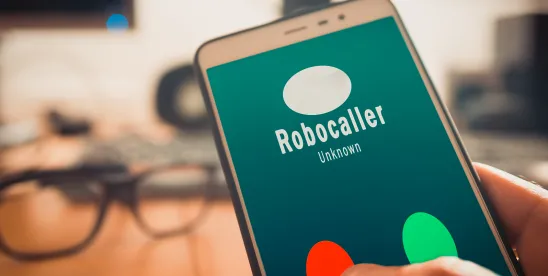The Federal Communications Commission’s (Commission) Enforcement Bureau (Bureau) launched a new “Spring Cleaning” initiative this month to combat unlawful robocalling campaigns.
On April 4, the Bureau sent a cease-and-desist letter to Veriwave Telco LLC (Veriwave), ordering the company to stop transmitting illegal call traffic on its network. According to the Public Notice released in conjunction with the cease-and-desist letter, the Bureau’s investigation found that roughly 15.8 million robocalls playing a prerecorded message about a nonexistent “National Tax Relief Program” originated on Veriwave’s network between November 1, 2023, and January 31, 2024. As part of the scam, the calls listed a series of “eligibility requirements” and then asked recipients to indicate whether they met those requirements. Recipients who indicated “yes” were connected to a live operator who asked for personal information, including the recipient’s date of birth and social security numbers. The calls also did not provide a callback number.
The cease-and-desist letter instructed Veriwave to take steps to effectively mitigate the traffic by April 8, 2024, and to investigate the calls and report its findings to the Commission by April 18, 2024. Failure to comply with the letter by either deadline will result in the Commission issuing an order permitting all US-based voice service providers to block all traffic from Veriwave. The Public Notice also found that Veriwave’s Robocall Mitigation Database (RMD) filing was deficient because it did not include valid contact information for communications related to its robocall mitigation program. Accordingly, Veriwave also faces removal from the RMD if it fails to update its filing. Removal from the RMD would mean that no downstream provider would be permitted to transmit Veriwave call traffic.
The Bureau took similar action against an illegal student debt relief scam calling campaign. In that case, the Bureau sent a cease-and-desist letter to DigitalIPVoice, Inc. (DigitalIPVoice) related to illegal robocalls the company transmitted that played a prerecorded message telling recipients that they were eligible for certain student debt relief but “never completed the required documents” and instructed them to call a telephone number back to “secure their benefits.” Like Veriwave, the Bureau ordered DigitalIPVoice to immediately take steps, including blocking the illegal traffic, if necessary, to prevent its network from continuing to be a source of illegal robocall traffic. DigitalIPVoice had until April 19, 2024, to effectively mitigate the unlawful traffic and until May 1, 2024, to comply with the requirement to investigate and report back on the calls. Again, as the related Public Notice states, failure to comply with either deadline will allowall US-based providers to block all call traffic from DigitalIPVoice.
As of this writing, the FCC has not stated whether either company met the compliance deadlines set forth in their respective cease-and-desist letters.
As part of the “Spring Cleaning” initiative, the Commission plans to work closely with other relevant federal agencies. For example, in the Veriwave case, the Commission partnered with the Federal Trade Commission and Internal Revenue Service to conduct its investigation. The Commission also worked with the Department of Education Federal Student Aid Office and the Consumer Financial Protection Bureau on its DigitalIPVoice investigation.
In announcing the initiative, the Commission explained that the timing was not a coincidence, but that it seeks to address “active scams particularly widespread during the spring season.” Notably, this includes the tax filing deadline, which the Commission pointed out is a feature that scam callers use to maximize their likelihood of success. This April, the Biden administration also announced that it was implementing additional student loan debt relief programs, creating another target for illegal robocallers.
Despite the already aggressive actions under the initiative, the Commission appears poised to stay on the offensive. Enforcement Bureau Chief Loyaan Egal said, “[w]e are taking the fight to those that want to defraud and cause harm to American consumers who simply want to determine if they are eligible for student loan debt relief. We want to thank our federal partners at the Department of Education and Consumer Financial Protection Bureau for helping reinforce our ‘Spring Cleaning’ initiative, and we will be working closely with other agencies throughout the spring to address different illegal robocall campaigns that are harming consumers.” Commission Chairwoman Rosenworcel stated that, “[w]hile illegal robocallers continue to try to hide from us, we’ll keep seeking them out and hold them accountable for putting consumers at risk.”





 />i
/>i

